

The literal definition of an attorney is: an appointed person who acts in someone else’s stead to make personal and financial decisions. To understand it better, an incapacitated individual who is referred to as the ‘principal’ appoints a person, who has the power of attorney and can take decisions on the principal’s behalf.
The principal decides the amount of power that he wants to vest with his attorney and he/she can be trusted with making both personal and financial decisions for the principal.
There are different types of power of attorney. Let’s understand them one by one.
#1. General Power Of Attorney
As the name suggests, a general power of attorney gives a wide range of powers to the attorney-in-fact to act on the principal’s behalf. Some of the powers that a general power of attorney has, include making financial decisions, purchasing life insurance for the principal, and seeing over other business related activities.

(Image Courtesy: Legal Laws)
#2. Special Power Of Attorney
In this type of power of attorney, a principal can decide the special powers that he wants to give his attorney-in-fact, i.e., he can decide what matters will be handled by the attorney-in-fact and what not.
(Image Courtesy: Legal Advisory)
#3. Durable Power Of Attorney
Say, the principal meets with an unfortunate accident that renders him mentally incompetent or causes some other severe injury, what happens to the power of attorney then? In such a case, the principal signs a durable power of attorney that safeguards the principal against any problems. Like the name itself, this power of attorney remains durable and intact irrespective of the health and mental condition of the principal.

(Image Courtesy: Investopedia)
#4. Health Care Power Of Attorney
As evident by the name itself, if the principal signs a health care power of attorney, then his agent can take all health related decisions on his behalf. These decisions might include the type of health insurance to buy and the amount of money to be spent during a medical condition.

(Image Courtesy: Walters Estate Planning)
When you sign a power of attorney, you literally give a part of your life in someone else’s hands. So, always make sure that your attorney-in-fact is someone you can blindly trust. This is the reason why people often choose their close relatives as their attorney-in-fact. The bottom line to all of this is that choose a person to be your agent only when you can blindly trust him/her.
If you found this article informative, let us know in the comments below.
(Featured Image Courtesy: Buyers Logic)
Providing someone the power or legal authority to make to make decisions on your behalf is the power of attorney. Though, there are different types of power of attorney as you have discussed in the above article. The rules of attaining the power to someone vary from state to state because there are certain guidelines to follow. Before you or any of your known one sign documents, however, make certain to consult with an attorney regarding all applicable regulations and laws. The attorney can be of any sort, be it a private affair, legal matter or business deals. The person who is replacing the other needs to act like a grantor, donor or principle. They will be definitely paid for that because if anything happens to your owner, you are the one answerable. According to the judiciary system, that person has been anywhere he's asked to on their owner's behalf. Under the deal, the donor or the grantee need to take all the responsibility for the owner’s action. Earlier the power of attorney could be signed and done, but presently it is signed and sealed. That is made to be a proper legal document as if anything wrong happens on the account of grantee or owner then can legally solve. Some Judiciary systems also take a few witness when the power of attorney is signed so that makes this process more reliable and convenient these days. There has a be a required mental capacity to sign the attorney papers. These can not be signed just on the basis of relation or familiarity. There is a certain durability which is specified for the power. The oral and written witnessing in court is very important as far as power of attorney is concerned. The court also keeps a duplicate copy of the documents to keep a record.